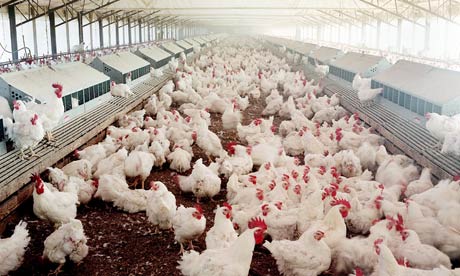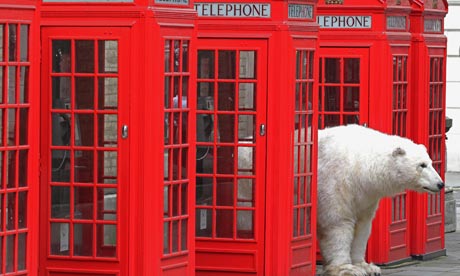
End of the line: economic incentives could be brought in to treat animals better. Photograph: Daniel Pepper/Getty Images
Despite the fact that US academic Jerry Anderson compares welfare of animals in large-scale farming operations to the plight of child workers in the 1800s, on the face of it animals have many more rights than they did two decades ago. So the phrase "animal welfare" is no longer an oxymoron to the mainstream public and we now recognise the plight of industrially farmed animals (apposite given that two in three animals born on this planet are now factory farmed).
Since 1 January sow stalls have been illegal throughout the EU and chickens have been "granted" freedom from battery cages. Hardly a day goes by without some new law for animals. The Born Free Foundation, with Abta, has just issued the first global welfare guidance for animals in the tourism trade reasoning that 60% of attractions feature "some kind of animal interaction". In 2007 the canton of Zurich even installed Antoine Goetschel as a designated Animal Advocate; a legal quasi Dr Dolittle, he talked for the animals.
Certainly Goetschel achieved quite a few has-the-world-gone-mad headlines when he represented a pike in a case that had seen a fisherman take 15 minutes to reel said pike to shore causing ? he alleged ? huge suffering (he lost). However he maintains (not least here on an Australian radio show) that a dedicated animal-welfare post is necessary because legal back-up is crucial to progressing animal rights and generic prosecutors do not have enough expertise. Only when we truly understand animal suffering can we really do something about it.
I don't think we do understand. We see a cow. We understand it's not a brick or a phone but a sentient creature but still some of us want to eat steak. According to research 95% of meat eaters today express an "avid" interest in animal welfare. Animal-welfare laws have sprung up to ease this dichotomy. It's the reason we now have "happy meat" (to summarise, rear the animal nicely then kill and eat it) and a slew of compassionate-farming labels that give us guarantees of higher welfare standards.
The evidence that they do good is persuasive ? especially to big business, as new-style welfare seems to work within the confines of industrialised agricultural systems (despite their huge ecological impact).
Temple Grandin, of Colorado State University, has explored economic incentives to treat animals better, such as fining producers for "fatigued" pigs on transport lorries or badly treated old breeding stock. Forget moral dressing-downs, this is about cold, hard cash and she says it makes standards better, and produces a better quality of meat.
This stance suggests everyone's a winner and has allowed a brand like McDonalds, a former animal-rights foe, to becomes a game changer by switching pork away from conventionally reared sources using gestation stalls. (This footage of pigs in gestation stalls never quite loses its impact. Warning). In the UK, McDonalds has switched its pork products to 100% Freedom Food certified, a label which upholds better welfare standards for pigs (10 million pigs are produced in the UK, 30% under Freedom Foods). At the RSPCA site you can send McDonalds a thank-you email.
Suffice it to say anti-welfare activists such as James LaVeck (who has written extensively about how animal rights organisations are turning into mcmovements ? see Green Speak below) will not be sending many thank yous. These are not just abolitionists (advocating the end of carnism and animal agriculture, which they claim would bring an ecological dividend, too) but those who believe that welfare reforms are just industry puff and "laws" with loopholes big enough to drive a giant tractor through. Furthermore they allege that the main animal-welfare groups have collaborated with animal agriculture and butchered the movement.
It has been suggested that this is sour grapes (vegans can eat those, can't they?) Now animals are treated better and we are all happy about happy meat, arguably there is no need to become a vegan. And law reform surrounding the interests of animals, once touted as the great social justice movement of our age, seems to have died off. Even Zurich's Animal Advocacy role was discontinued in 2011.
I don't think so. I'm not a vegan but I think they're right. In truth, much animal welfare is about consumer rights ? ie better traceability because we want to know if we're eating horse (not because it's wrong to eat horse) or to guarantee that hens have been in enriched cages (rather than battery cages, a distinction many animal rights advocates say is academic) because we have a right to low-cost eggs.
If you have an ethical dilemma, send an email to Lucy at lucy.siegle@observer.co.uk
 Paula Bear, of Greenpeace's Save the Arctic campaign. Photograph: Elizabeth Dalziel/Greenpeace
Paula Bear, of Greenpeace's Save the Arctic campaign. Photograph: Elizabeth Dalziel/Greenpeace Green crush of the week
If you see a polar bear sauntering towards you, there's no need for alarm. Paula Bear is the mascot of Greenpeace's Save the Arctic campaign, calling for a global sanctuary at the top of the world (savethearctic.org). She has had a previous career treading the boards at the National in the climate-change drama Greenland. When the play ended the fake bear was purchased (for ?4,000) by Greenpeace UK and has since been on tour with Radiohead and starred with Jude Law in a campaign video. With more gravitas than Pooh and Paddington, she is a?bear icon for our times.
Greenspeak: McMovement {m?k-m?v-m:nt} noun
The McMovement is characterised by closeness between a campaigning organisation and big industry to develop standards and certification in animal welfare, such as cage-free eggs. Progress ? or compromise?
Source: http://www.guardian.co.uk/environment/2013/jul/07/is-animal-welfare-fair
stacey dash christopher columbus columbus day columbus day Stacy Dash Amber Tamblyn Lilit Avagyan
No comments:
Post a Comment
Note: Only a member of this blog may post a comment.